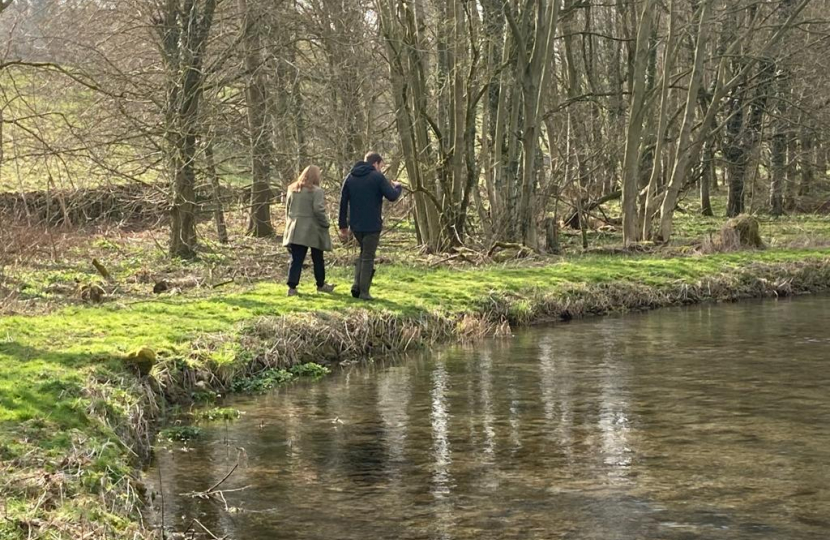
Our rivers shape and sustain our surroundings and, whether it is the central function they play in supporting our natural environment, or the enjoyment and pleasure we take from visiting them, they are arguably our landscape’s most important feature. I have spent many an hour by the rivers in Derbyshire Dales, both as a child and now as a Member of Parliament, meeting with River Managers and constituents. When I am in Westminster I am reminded of the national significance of our rivers when I often have the opportunity to look out across the Thames. It is a conveyor belt of activity, rich in history and cultural significance. It functions as many things; a transport system, a historical landmark, and even, a bit further downstream, a playing field for sailors, rowers and occasionally swimmers, much like our rivers here in Derbyshire Dales.
However, the capital’s river is also notorious for its muddy brown water, and, like me, I expect pollution is one of the first things that comes to mind if you were to spend the time to think about the Thames. Notably, so impressive was this impression for T.S Eliot, that within The Waste Land he even used the Thames as a metaphor for themes of pollution.
Unfortunately, river pollution is not simply a plague in our great metropolis but a national issue, affecting rivers in rural areas like ours. There has been a passionate - and sometimes poorly informed - national conversation about the volume of untreated sewerage in both rivers and the sea. I know many constituents share my enthusiasm for the conservation of our local watercourses, and I wanted to share with you my commitment to champion the rivers here in the Dales.
I would like to take this opportunity refute the accusations I have recently faced that I, or the Government, have opposed genuine attempts to limit sewerage in our rivers. Often this suggestion relies on the fact that the Government opposed an amendment to the Environment Bill last year that would have both cost the taxpayer many hundreds of billions of pounds and would have likely flooded homes with backed up raw sewage at times of heavy rain. Bolting these overflows shut overnight is not an appropriate nor realistic solution, although I do genuinely wish it could be that simple.
Successive Governments have failed to introduce measures to properly modernise our, sometimes Victorian era, sewerage systems. The passing of the Environment Bill last year, but more importantly the recent publishing of the “Storm Overflows Discharge Reduction Plan” contains the first meaningful commitments in this policy area. Remarkably, it was only due to the recent legislation that 90% of storm overflows are now monitored from just 5% a decade ago. In the Plan, water companies have been mandated to invest at least £56 billion into their infrastructure between now and 2050 to achieve a number of legally binding targets, which include ensuring that by 2035 at least 75% of all storm overflows are not adversely affecting the local environment. In our area, I understand Severn Trent Water has promised to dramatically reduce their use of storm overflows by 2025, with all adverse effects of their use nullified by 2030.
One of the main reasons for the use of overflows is the speed at which rainwater is directed immediately into our sewers, and I am pleased the Government is currently consulting on ways to improve surface water management practices. These steps include granting water companies the right to discharge rainwater into watercourses, the authority to mend broken pipes on private property, strengthening regulations pertaining to drainage systems, and allowing companies to announce fresh investment into their infrastructure within their five year funding cycles.
Finally, I’d like to add that we can also all do our small part to help. Earlier this year I visited Matlock for the Environment Agency’s “Name the Crane” event where there was a stall with a physical demonstration of how different measures affect surface run off times. The display included two semi-detached homes, one home with a green roof, water butt, permeable drive and garden, and the other without. When the water was poured onto the house, it was as clear as day how those items made an enormous difference to how much water immediately accumulated below each side of the exhibit. Furthermore, wet wipes, grease and other sanitary products have an enormous impact on the efficiency of our drains and we should redouble our efforts to ensure we are disposing of our household waste appropriately - for the sake of our rivers, and the men and women ultimately tasked with unblocking the “bergs” these items create.
I look forward to meeting ministerial colleagues and Severn Trent Water in the coming weeks to ensure both our local water company and Westminster are moving at pace to improve the water quality here in Derbyshire Dales, and I will of course, keep you up to date with the progress of my activities on this matter. Our rivers are one of our country’s principal assets, and I will not hesitate to press decision-makers for swift improvements.

